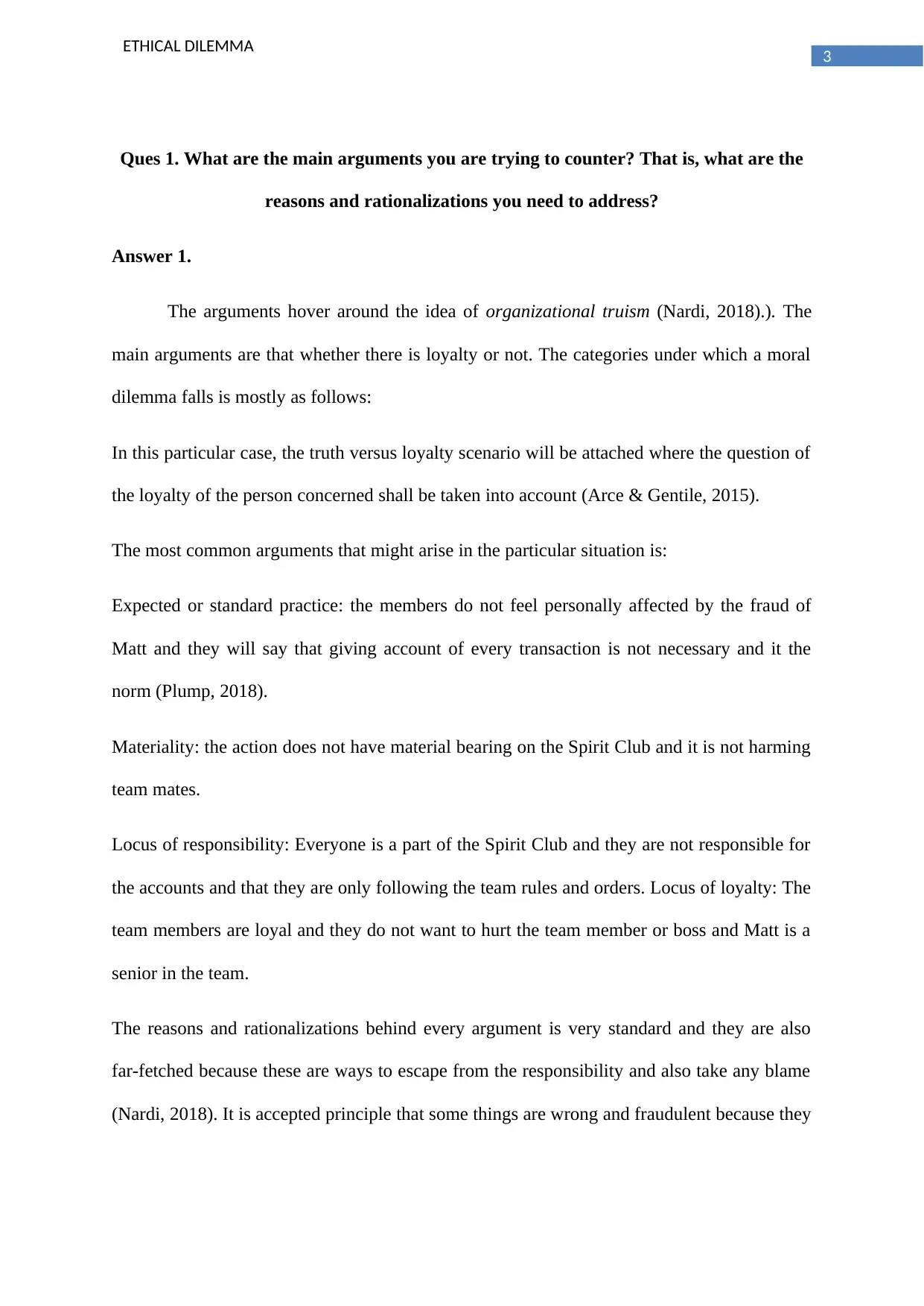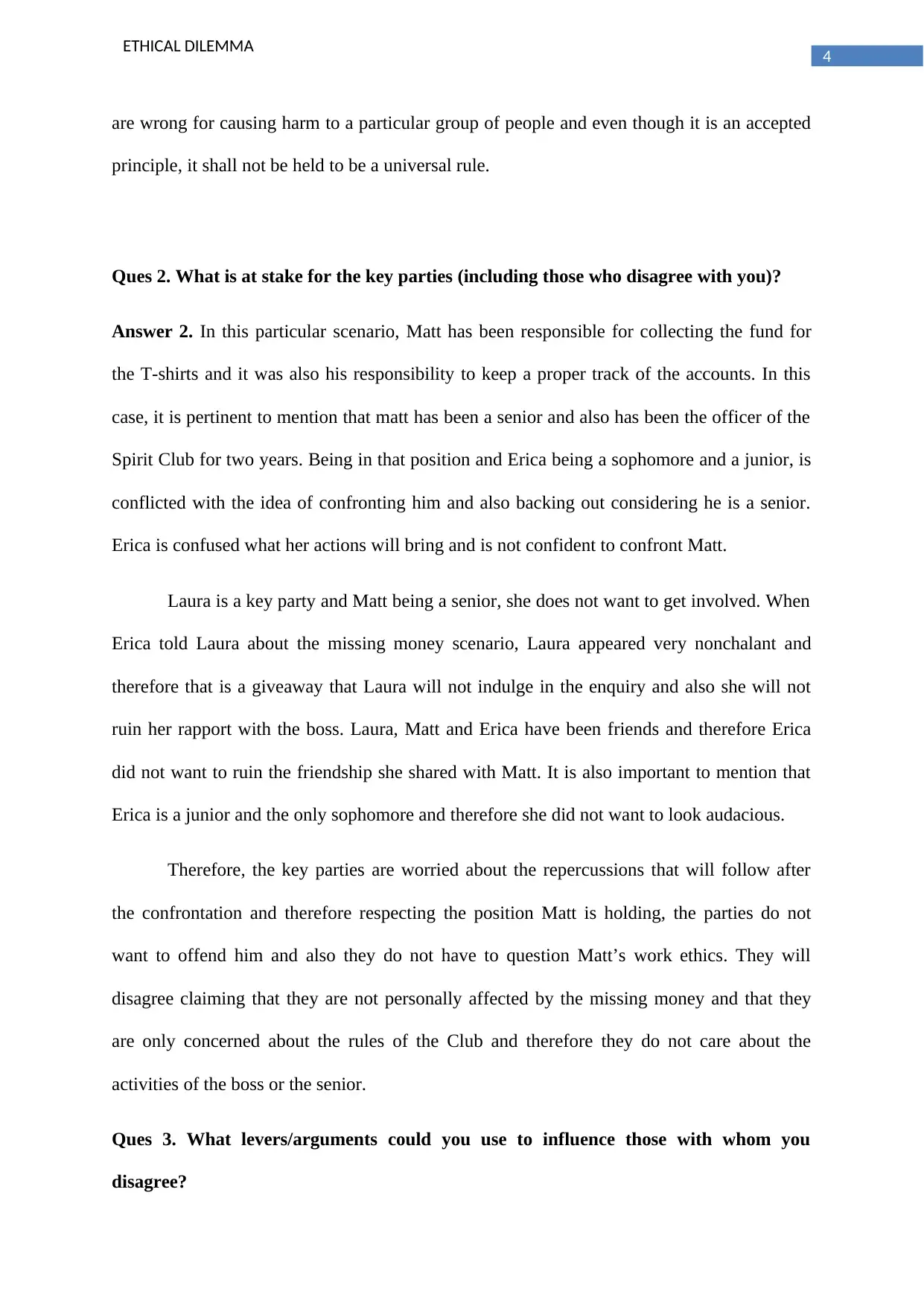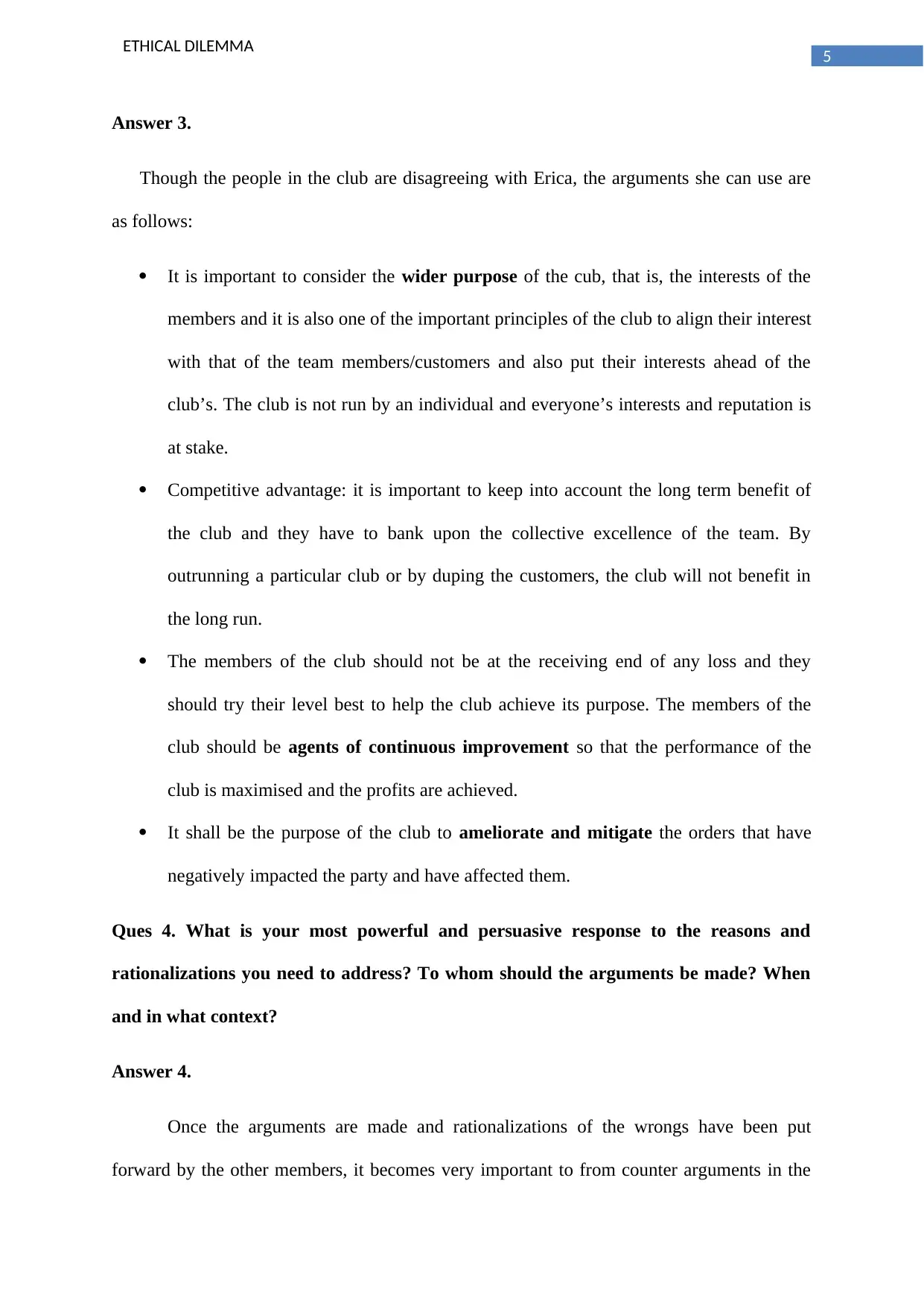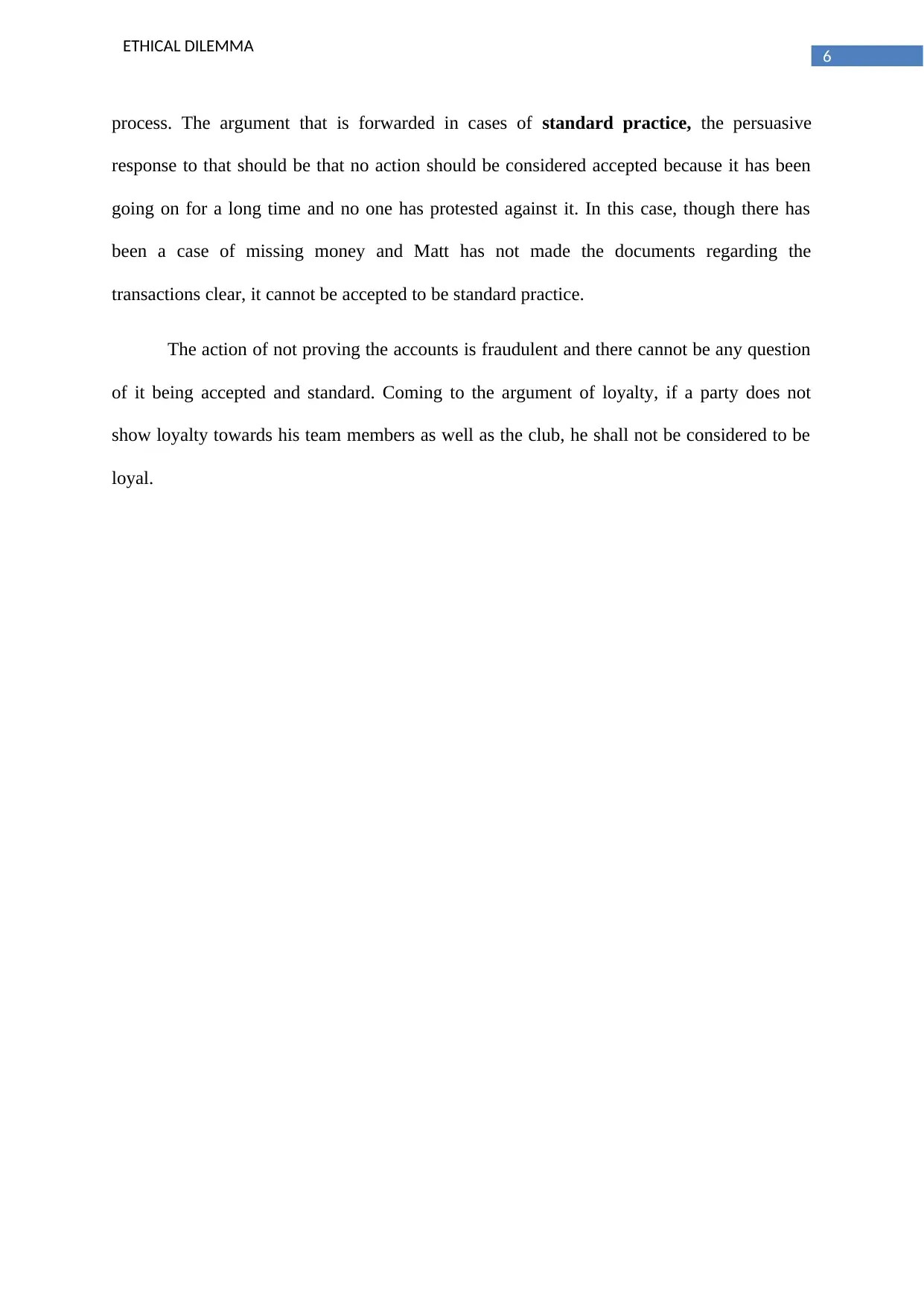Workplace Ethics: Applying Giving Voice to Values Framework
VerifiedAdded on 2023/06/11
|8
|1538
|97
Case Study
AI Summary
This case study examines an ethical dilemma within a university Spirit Club, where a treasurer, Matt, may have mishandled funds collected for T-shirts. Erica, a sophomore and the club's treasurer, discovers a cash deficit and grapples with whether to confront Matt, the president and a senior member. The analysis applies the Giving Voice to Values (GVV) framework to address the ethical considerations. It identifies arguments to counter, such as loyalty to Matt and the perception of immateriality of the missing funds. The study assesses what is at stake for key parties like Erica, Matt, and Laura, considering their relationships and positions within the club. It explores levers and arguments Erica could use, emphasizing the club's wider purpose, the importance of member interests, and the need for continuous improvement. The most persuasive response involves addressing rationalizations, such as the acceptance of standard practices, by highlighting the fraudulent nature of not providing clear transaction records. The study concludes by underscoring the importance of loyalty to the team members and the club, advocating for transparency and accountability in financial matters. Desklib provides access to similar case studies and solutions for students.

Running head: ETHICAL DILEMMA
Ethical Dilemma
Name of the Student
Name of the University
Author Note
Ethical Dilemma
Name of the Student
Name of the University
Author Note
Paraphrase This Document
Need a fresh take? Get an instant paraphrase of this document with our AI Paraphraser

1
ETHICAL DILEMMA
ETHICAL DILEMMA

2
ETHICAL DILEMMA
Nu
m
be
r
Worldview What to say To Whom When How
1 Giving voice to values That the money should
have been deposited in
the club account
Laura 9:30 a.m Coffee shop
2 Theory of decision
making.
Laura told Erica that she
should talk to Matt.
Erica 9:40 a.m Coffee shop
3 Theory of embezzlement That there is a cash
deficit
Matt 12:00
pm
hallway
4 Theory of conformation Matt replies to Erica that
he will correct the
mistake
Erica 12:15
p.m
Hallway
5 The concept right
decision making
Erica told Matt that she
will help with the
calculation
Matt 12: 17
p.m
hallway
6 The theory of reasons
and rationalizations
Matt said he will not
need any help and will
rectify the mistake
Erica 12:20
p.m
hallway
7 Nonchalant behaviour Laura seemed very
nonchalant in her
approach
Erica 9:45 am. Coffee shop
8
ETHICAL DILEMMA
Nu
m
be
r
Worldview What to say To Whom When How
1 Giving voice to values That the money should
have been deposited in
the club account
Laura 9:30 a.m Coffee shop
2 Theory of decision
making.
Laura told Erica that she
should talk to Matt.
Erica 9:40 a.m Coffee shop
3 Theory of embezzlement That there is a cash
deficit
Matt 12:00
pm
hallway
4 Theory of conformation Matt replies to Erica that
he will correct the
mistake
Erica 12:15
p.m
Hallway
5 The concept right
decision making
Erica told Matt that she
will help with the
calculation
Matt 12: 17
p.m
hallway
6 The theory of reasons
and rationalizations
Matt said he will not
need any help and will
rectify the mistake
Erica 12:20
p.m
hallway
7 Nonchalant behaviour Laura seemed very
nonchalant in her
approach
Erica 9:45 am. Coffee shop
8
⊘ This is a preview!⊘
Do you want full access?
Subscribe today to unlock all pages.

Trusted by 1+ million students worldwide

3
ETHICAL DILEMMA
Ques 1. What are the main arguments you are trying to counter? That is, what are the
reasons and rationalizations you need to address?
Answer 1.
The arguments hover around the idea of organizational truism (Nardi, 2018).). The
main arguments are that whether there is loyalty or not. The categories under which a moral
dilemma falls is mostly as follows:
In this particular case, the truth versus loyalty scenario will be attached where the question of
the loyalty of the person concerned shall be taken into account (Arce & Gentile, 2015).
The most common arguments that might arise in the particular situation is:
Expected or standard practice: the members do not feel personally affected by the fraud of
Matt and they will say that giving account of every transaction is not necessary and it the
norm (Plump, 2018).
Materiality: the action does not have material bearing on the Spirit Club and it is not harming
team mates.
Locus of responsibility: Everyone is a part of the Spirit Club and they are not responsible for
the accounts and that they are only following the team rules and orders. Locus of loyalty: The
team members are loyal and they do not want to hurt the team member or boss and Matt is a
senior in the team.
The reasons and rationalizations behind every argument is very standard and they are also
far-fetched because these are ways to escape from the responsibility and also take any blame
(Nardi, 2018). It is accepted principle that some things are wrong and fraudulent because they
ETHICAL DILEMMA
Ques 1. What are the main arguments you are trying to counter? That is, what are the
reasons and rationalizations you need to address?
Answer 1.
The arguments hover around the idea of organizational truism (Nardi, 2018).). The
main arguments are that whether there is loyalty or not. The categories under which a moral
dilemma falls is mostly as follows:
In this particular case, the truth versus loyalty scenario will be attached where the question of
the loyalty of the person concerned shall be taken into account (Arce & Gentile, 2015).
The most common arguments that might arise in the particular situation is:
Expected or standard practice: the members do not feel personally affected by the fraud of
Matt and they will say that giving account of every transaction is not necessary and it the
norm (Plump, 2018).
Materiality: the action does not have material bearing on the Spirit Club and it is not harming
team mates.
Locus of responsibility: Everyone is a part of the Spirit Club and they are not responsible for
the accounts and that they are only following the team rules and orders. Locus of loyalty: The
team members are loyal and they do not want to hurt the team member or boss and Matt is a
senior in the team.
The reasons and rationalizations behind every argument is very standard and they are also
far-fetched because these are ways to escape from the responsibility and also take any blame
(Nardi, 2018). It is accepted principle that some things are wrong and fraudulent because they
Paraphrase This Document
Need a fresh take? Get an instant paraphrase of this document with our AI Paraphraser

4
ETHICAL DILEMMA
are wrong for causing harm to a particular group of people and even though it is an accepted
principle, it shall not be held to be a universal rule.
Ques 2. What is at stake for the key parties (including those who disagree with you)?
Answer 2. In this particular scenario, Matt has been responsible for collecting the fund for
the T-shirts and it was also his responsibility to keep a proper track of the accounts. In this
case, it is pertinent to mention that matt has been a senior and also has been the officer of the
Spirit Club for two years. Being in that position and Erica being a sophomore and a junior, is
conflicted with the idea of confronting him and also backing out considering he is a senior.
Erica is confused what her actions will bring and is not confident to confront Matt.
Laura is a key party and Matt being a senior, she does not want to get involved. When
Erica told Laura about the missing money scenario, Laura appeared very nonchalant and
therefore that is a giveaway that Laura will not indulge in the enquiry and also she will not
ruin her rapport with the boss. Laura, Matt and Erica have been friends and therefore Erica
did not want to ruin the friendship she shared with Matt. It is also important to mention that
Erica is a junior and the only sophomore and therefore she did not want to look audacious.
Therefore, the key parties are worried about the repercussions that will follow after
the confrontation and therefore respecting the position Matt is holding, the parties do not
want to offend him and also they do not have to question Matt’s work ethics. They will
disagree claiming that they are not personally affected by the missing money and that they
are only concerned about the rules of the Club and therefore they do not care about the
activities of the boss or the senior.
Ques 3. What levers/arguments could you use to influence those with whom you
disagree?
ETHICAL DILEMMA
are wrong for causing harm to a particular group of people and even though it is an accepted
principle, it shall not be held to be a universal rule.
Ques 2. What is at stake for the key parties (including those who disagree with you)?
Answer 2. In this particular scenario, Matt has been responsible for collecting the fund for
the T-shirts and it was also his responsibility to keep a proper track of the accounts. In this
case, it is pertinent to mention that matt has been a senior and also has been the officer of the
Spirit Club for two years. Being in that position and Erica being a sophomore and a junior, is
conflicted with the idea of confronting him and also backing out considering he is a senior.
Erica is confused what her actions will bring and is not confident to confront Matt.
Laura is a key party and Matt being a senior, she does not want to get involved. When
Erica told Laura about the missing money scenario, Laura appeared very nonchalant and
therefore that is a giveaway that Laura will not indulge in the enquiry and also she will not
ruin her rapport with the boss. Laura, Matt and Erica have been friends and therefore Erica
did not want to ruin the friendship she shared with Matt. It is also important to mention that
Erica is a junior and the only sophomore and therefore she did not want to look audacious.
Therefore, the key parties are worried about the repercussions that will follow after
the confrontation and therefore respecting the position Matt is holding, the parties do not
want to offend him and also they do not have to question Matt’s work ethics. They will
disagree claiming that they are not personally affected by the missing money and that they
are only concerned about the rules of the Club and therefore they do not care about the
activities of the boss or the senior.
Ques 3. What levers/arguments could you use to influence those with whom you
disagree?

5
ETHICAL DILEMMA
Answer 3.
Though the people in the club are disagreeing with Erica, the arguments she can use are
as follows:
It is important to consider the wider purpose of the cub, that is, the interests of the
members and it is also one of the important principles of the club to align their interest
with that of the team members/customers and also put their interests ahead of the
club’s. The club is not run by an individual and everyone’s interests and reputation is
at stake.
Competitive advantage: it is important to keep into account the long term benefit of
the club and they have to bank upon the collective excellence of the team. By
outrunning a particular club or by duping the customers, the club will not benefit in
the long run.
The members of the club should not be at the receiving end of any loss and they
should try their level best to help the club achieve its purpose. The members of the
club should be agents of continuous improvement so that the performance of the
club is maximised and the profits are achieved.
It shall be the purpose of the club to ameliorate and mitigate the orders that have
negatively impacted the party and have affected them.
Ques 4. What is your most powerful and persuasive response to the reasons and
rationalizations you need to address? To whom should the arguments be made? When
and in what context?
Answer 4.
Once the arguments are made and rationalizations of the wrongs have been put
forward by the other members, it becomes very important to from counter arguments in the
ETHICAL DILEMMA
Answer 3.
Though the people in the club are disagreeing with Erica, the arguments she can use are
as follows:
It is important to consider the wider purpose of the cub, that is, the interests of the
members and it is also one of the important principles of the club to align their interest
with that of the team members/customers and also put their interests ahead of the
club’s. The club is not run by an individual and everyone’s interests and reputation is
at stake.
Competitive advantage: it is important to keep into account the long term benefit of
the club and they have to bank upon the collective excellence of the team. By
outrunning a particular club or by duping the customers, the club will not benefit in
the long run.
The members of the club should not be at the receiving end of any loss and they
should try their level best to help the club achieve its purpose. The members of the
club should be agents of continuous improvement so that the performance of the
club is maximised and the profits are achieved.
It shall be the purpose of the club to ameliorate and mitigate the orders that have
negatively impacted the party and have affected them.
Ques 4. What is your most powerful and persuasive response to the reasons and
rationalizations you need to address? To whom should the arguments be made? When
and in what context?
Answer 4.
Once the arguments are made and rationalizations of the wrongs have been put
forward by the other members, it becomes very important to from counter arguments in the
⊘ This is a preview!⊘
Do you want full access?
Subscribe today to unlock all pages.

Trusted by 1+ million students worldwide

6
ETHICAL DILEMMA
process. The argument that is forwarded in cases of standard practice, the persuasive
response to that should be that no action should be considered accepted because it has been
going on for a long time and no one has protested against it. In this case, though there has
been a case of missing money and Matt has not made the documents regarding the
transactions clear, it cannot be accepted to be standard practice.
The action of not proving the accounts is fraudulent and there cannot be any question
of it being accepted and standard. Coming to the argument of loyalty, if a party does not
show loyalty towards his team members as well as the club, he shall not be considered to be
loyal.
ETHICAL DILEMMA
process. The argument that is forwarded in cases of standard practice, the persuasive
response to that should be that no action should be considered accepted because it has been
going on for a long time and no one has protested against it. In this case, though there has
been a case of missing money and Matt has not made the documents regarding the
transactions clear, it cannot be accepted to be standard practice.
The action of not proving the accounts is fraudulent and there cannot be any question
of it being accepted and standard. Coming to the argument of loyalty, if a party does not
show loyalty towards his team members as well as the club, he shall not be considered to be
loyal.
Paraphrase This Document
Need a fresh take? Get an instant paraphrase of this document with our AI Paraphraser

7
ETHICAL DILEMMA
Bibliography
Arce, D. G., & Gentile, M. C. (2015). Giving voice to values as a leverage point in business
ethics education. Journal of Business Ethics, 131(3), 535-542.
Gee, J. (2018). The new work order. Routledge.
Holmes, V. (2015). ‘Giving Voice to Values’: enhancing students’ capacity to cope with
ethical challenges in legal practice. Legal Ethics, 18(2), 115-137.
Lawrence, A. T., & Melnyk, J. (2015). What Is a Giving Voice to Values Case?. Case
Research Journal, 35(2).
Lynch, S., Hart, B., & Costa, C. M. (2014). Giving voice to values: An undergraduate nursing
curriculum project. Collegian, 21(4), 367-373.
Nardi, P. M. (2018). Doing survey research: A guide to quantitative methods. Routledge.
Plump, C. (2018). Giving Voice to Values in the Legal Profession: Effective Advocacy with
Integrity. Routledge.
Riemenschneider, C. K., Manly, T. S., & Leonard, L. N. (2016). Using Giving Voice to
Values to Improve Student Academic Integrity in Information Technology
Contexts. Journal of Information Systems Education, 27(3).
ETHICAL DILEMMA
Bibliography
Arce, D. G., & Gentile, M. C. (2015). Giving voice to values as a leverage point in business
ethics education. Journal of Business Ethics, 131(3), 535-542.
Gee, J. (2018). The new work order. Routledge.
Holmes, V. (2015). ‘Giving Voice to Values’: enhancing students’ capacity to cope with
ethical challenges in legal practice. Legal Ethics, 18(2), 115-137.
Lawrence, A. T., & Melnyk, J. (2015). What Is a Giving Voice to Values Case?. Case
Research Journal, 35(2).
Lynch, S., Hart, B., & Costa, C. M. (2014). Giving voice to values: An undergraduate nursing
curriculum project. Collegian, 21(4), 367-373.
Nardi, P. M. (2018). Doing survey research: A guide to quantitative methods. Routledge.
Plump, C. (2018). Giving Voice to Values in the Legal Profession: Effective Advocacy with
Integrity. Routledge.
Riemenschneider, C. K., Manly, T. S., & Leonard, L. N. (2016). Using Giving Voice to
Values to Improve Student Academic Integrity in Information Technology
Contexts. Journal of Information Systems Education, 27(3).
1 out of 8
Your All-in-One AI-Powered Toolkit for Academic Success.
+13062052269
info@desklib.com
Available 24*7 on WhatsApp / Email
![[object Object]](/_next/static/media/star-bottom.7253800d.svg)
Unlock your academic potential
Copyright © 2020–2026 A2Z Services. All Rights Reserved. Developed and managed by ZUCOL.